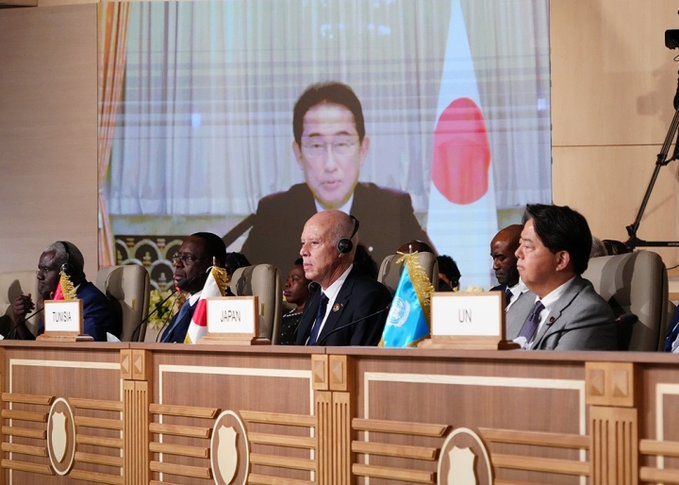
What is TICAD?
TICAD stands for Tokyo International Conference on African Development. The government of Japan has been leading this conference since 1993, co-organized by UN-Office of Special Adviser on Africa (OSAA), United Nations Development Programme (UNDP), The World Bank Group and African Union Commission (AUC).
The launch of TICAD was catalytic for refocusing international attention on Africa’s development needs. In the course of nearly 30 years, TICAD has evolved into a major global and open and multilateral forum for mobilizing and sustaining international support for Africa’s development under the principles of African “ownership” and international “partnership.”
Video Source: YouTube © MOFA Japan
-
1993
TICAD I | Tokyo
At the first conference (TICAD I), the co-organizers vowed to reverse the decline in development assistance for Africa that had followed the end of the Cold War. Participants adopted the Tokyo Declaration on African Development, committing to the pursuit of political and economic reforms in Africa, increased private sector development, regional cooperation and integration, and the harnessing of Asian experience for the benefit of African development. -
1998
TICAD II | Tokyo
The second conference (TICAD II) addressed Africa’s development challenges with poverty reduction and the integration of Africa into the global economy as a primary theme. The Tokyo Agenda for Action (TAA) outlined a framework of cooperation in the TICAD process identifying shared goals, objectives and guidelines for actions to be taken by Africa and its partners. TICAD II also advocated the dual principles of TICAD: the ownership of Africa and the partnership of the international community. -
2003
TICAD III | Tokyo
The third conference (TICAD III) made an explicit commitment for the TICAD Initiative to support the African Union’s New Partnership for Africa’s Development (NEPAD), which is a blueprint for Africa’s peace and socio-economic growth and development. The TICAD 10th Anniversary Declaration, an outcome statement that renewed the commitment of leaders for African development, was adopted at the conference, placing special emphasis on the concept of human security. -
2008
TICAD IV | Yokohama
TICAD IV addressed the following three priority areas: 1) Boosting economic growth; 2) Ensuring “human security,” including the achievement of the Millennium Development Goals (MDGs) and the consolidation of peace and good governance; and 3) Addressing environmental issues and climate change. TICAD IV was attended by approximately 3,000 delegates, including 41 African heads of state. The Yokohama Declaration, political commitment towards African development, was adopted. -
2013
TICAD V | Yokohama
The fifth conference (TICAD V) was held in Yokohama, Japan, on June 1-3, 2013. TICAD V also commemorated the 20th anniversary of the TICAD process and the 50th anniversary of the Organization of African Unity, the predecessor of the African Union. “Hand in Hand with a More Dynamic Africa” was the overarching theme for TICAD V. The discussions were based on the three interrelated themes of “Robust and Sustainable Economy,” “Inclusive and Resilient Society” and “Peace and Stability.” -
2016
TICAD VI | Nairobi
TICAD VI was the first TICAD meeting to be held on the African continent, in Nairobi, Kenya. It was also the first TICAD since it was decided that TICAD be held once in 3 years. It was attended by 11,000 people including business persons from about 200 Japanese companies. The discussions were based on “Promoting structural economic transformation through economic diversification and industrialization”, “Promoting resilient health systems for quality of life” and “Promoting social stability for shared prosperity”. -
2019
TICAD VII | Yokohama
TICAD7 was held on 28th - 30th August, 2019 at Pacifico Yokohama, Yokohama city, Japan, with more than 10,000 people, including 42 African leaders from 53 African countries, 52 development partner countries, 108 heads of international and regional organizations, and representatives of civil society and the private sector.
TICAD 7
Advancing Africa’s development through people, technology and innovation
TICAD7 was held in Yokohama, Japan from August 28 to 30, 2019 under the theme of “Advancing Africa’s development through People, Technology and Innovation” with the participation of 53 African countries including 42 African leaders, development partner countries, international/regional organizations as well as representatives from private sector and civil society.
The conference adopted the Yokohama Declaration 2019 (English, French, Japanese) and the Yokohama Plan of Actions 2019.
The Yokohama Declaration 2019 endorses the theme of TICAD 7, “Advancing Africa’s Development through People, Technology and Innovation”. It also reinforces the three pillars of TICAD 7: i) accelerating economic transformation and improving business environment through innovation and private sector engagement; ii) deepening sustainable and resilient society; and iii) strengthening peace and stability. For each of these pillars, the Declaration commend achievements, highlights outstanding issues, and promotes continued collaboration and actions to advance progress.
The Yokohama Plan of Actions 2019 (YPA2019) which accompanies the Declaration, lists actions expected to be implemented by the TICAD partners in order to promote focus areas of the three main pillars of the Yokohama Declaration 2019 adopted at TICAD 7. The Yokohama Plan of Action 2019 is an evolving document which will be updated at any time after TICAD 7 by each TICAD partner.
TICAD Monitor
The TICAD co-organizers launched the monitoring website, ‘TICAD Monitor’, to update the progress made under the Plan of Actions. The TICAD co-organizers and the partners are invited to register the website to report their most recent information (Measures / Initiatives, Expected Outcomes & Result/State of Progress) for promoting focus areas of the three main pillars of the Declaration.
The Guidance Note on Updating the Plan of Actions will be referred as a practical guideline to facilitate partners’ inputs.


